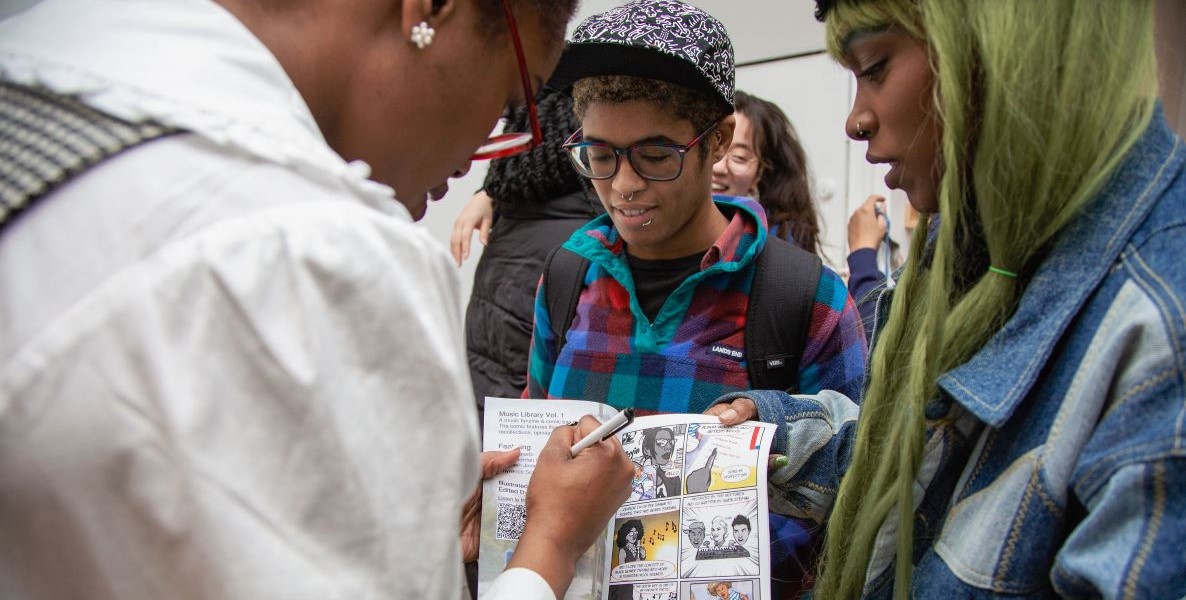Perhaps you remember being a child and obsessively drawing your favorite cartoon character. Kelechi Azu was the same when she was a kid, turning fantastical worlds into tangible items that could be held close. Now as a professional comic artist, Azu still is turning the intangible into something concrete. Her latest comic, Music Library, features a collection of illustrated interviews in which people discuss the music that has impacted their life.
Azu understands that music is personal and that there is no way she can perfectly understand what is in someone’s heart when they talk about a record. She accepts this challenge with inspired gusto. “Whatever is going on with another person is a mystery,” she says. “That’s exciting, but my interpretation of that mystery is also entertaining as well.”
Each page of Music Library contains illustrations of the interviewee, reinterpretations of album covers and music videos, and expressive visuals that capture the feeling of falling into a favorite song.
One thing I learned while I was at art school is something that Tim Belknap, one of my teachers, told me: “You either live to make art or you make art to live.” And in my head I was like, “I already know I live to make art!”
Azu, age 27, is a Nigerian American who holds pride in her heritage and the heritages of others. In addition to drawing comics, Azu has worked as an arts educator in Philadelphia and was a founding member of Artists of Color Collective, a group for students of color who attend Tyler School or Art and Architecture. For Azu, there are always more ways to build connections and to learn from each other. All it takes is an open mind and the willingness to keep asking questions.
In partnership with Forman Arts Initiative, we connected with Azu to learn more about her work. This interview has been condensed and edited.
Logan Cryer: I’ve talked to a lot of artists who say drawing comics is how they got started in art making. You’ve really stuck with it!
Kelechi Azu: I started drawing when I was three or four. I wanted to know how to draw because I liked the stuff I saw on TV and I wanted to make my own. I remember asking my neighbor to teach me how to draw, and she taught me how to do the squiggle for the nose and the arches for the eyes, which I still do, and the smile with the little cheek lines. I just kept doing that and doing that and doing that.
I would get napkins and tape them together and do each Powerpuff Girl. I just wanted my own stuff and I guess I just wanted to be able to make things for myself. That’s when I started to get into sewing because my mom would sew and I would see her stuff. My first machine was a Bratz machine.
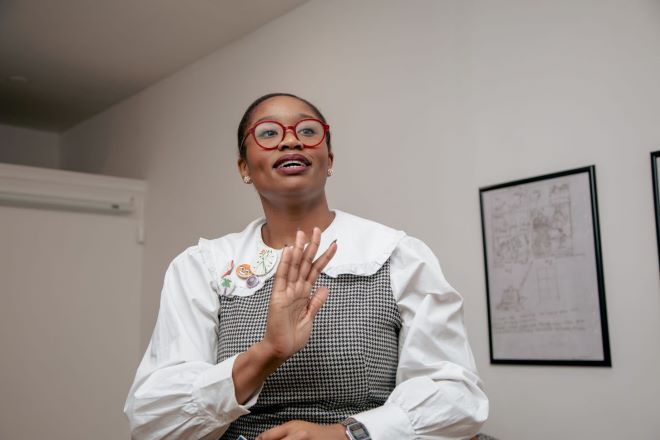
Can you tell me about your relationship to Philadelphia?
I’m based in Philadelphia and I grew up in Philadelphia. My family, when they first came here [from Nigeria], came to Philadelphia. Later we moved to New Jersey. I went to school at Tyler School of Art and Architecture, so I spent most of my creative professional experience in Philadelphia. That helped me really grow as an artist because I had access to a community and I had access to resources.
I graduated from Tyler with a sculpture degree. I really liked working on videos, small little animations and soft sculpture, especially. A mixture of illustration and soft sculpture was always my thing.
How was that experience?
I definitely enjoyed it, but there were a lot of pluses and minuses. One thing I learned while I was at art school is something that Tim Belknap, one of my teachers, told me: “You either live to make art or you make art to live.” And in my head I was like, “I already know I live to make art!”
But I learned that other people go to art school because they want to make art to live. And I get it, obviously we need to survive, but I make this stuff because I don’t think I have a choice. This is my survival. It’s so fulfilling to me I can’t imagine doing anything else. That was one of those really important things about art school that I had to learn, that not all of my peers are here for the same reason and that I needed to focus on why I’m here.
Unfortunately that was only sinking into my head senior year. I remember that my senior year was also an intense experience for me because I also was running this group, which is still going, Artists of Color Collective.
When I was at Tyler, there was no group for artists of color. I remembered I initially just wanted it to be for Black students because I was having trouble making Black friends at that time. You just didn’t find a lot of Black kids or Black staff and that was an issue. I knew other students of color had things they wanted to say that they felt they couldn’t say in front of their White peers, or they felt like their White peers just wouldn’t understand. I was working with the group my senior year and I had another artist, Michael Delgado, who’s a video artist, as the co-host.
It seems like a recurring motivation in your life is the desire to build a connection between yourself and others. Does that sound correct?
To an extent. I think at a certain time it’s very cool to interact with other people in relation to yourself. But maybe I grew out of that or maybe that’s just not something that moves me as much. Right now [I’m motivated by] getting to know other people. That’s what I’ve been doing with Music Library. People are sharing their stories about music with me and I might not necessarily understand what’s going on in their head but hearing their own personal experiences … something about that is exciting. This is a whole other being that exists on this planet, and they’re telling me these things and I can relate to an extent but I also can’t. But whatever is going on in my imagination is also entertaining. I think somebody else might find it entertaining.
Can you describe in more detail what Music Library is?
Music Library is a comic where people share their stories about music and I share my interpretations of their stories. The music can either mean a lot to them, or they have a connection with it that they might think is worth sharing. It’s a comic and it’s also a community. The community is the people who are featured in the comic.
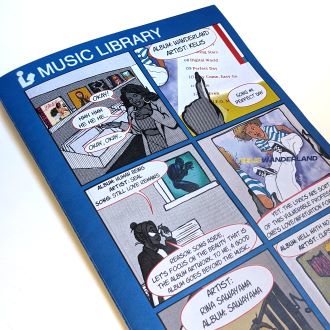
Would you say you’re a music nerd?
Yes! I’m just excited about putting people onto new music and who’s involved in what and stuff like that. But then I’ve also noticed that with other music fans, they care about other areas of music that I’m not even thinking about.
I do gravitate towards a lot of people who are involved in making music or sharing music. I do find myself around a lot of people who admire a lot of music and who like to go out and party and listen to music all night long. With Music Library, I was like, This would be a dream project because I get to talk about music and draw at the same time.
What is the comic community like in Philadelphia? Is it relatively large?
It feels like there’s a good amount to the point where there’s known artists. For example, a known comic artist in Philly would be Box Brown. Right now he’s working on this one comic called Legalization Nation.
I remember reading some of his old stuff whenever I would go to a comic or ’zine festival. I honestly think that Philly is more a ’zine sort of scene because ’zines are accessible, they’re easy to make, they don’t cost that much to buy. You see a lot of ’zine festivals in Philly, and I learned a lot about comic artists through them.
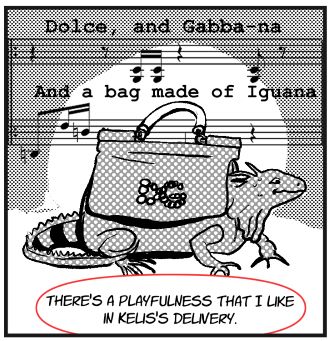
I remember I used to message this comic artist whose name is Johnny Samson and ask him for advice, and he would get back to me so fast and with such a kind response. Those are the little things that help you make connections. Then I would see him at a fair and talk to him about his work, and he would share more with me.
You get to know people, understand how things work, understand how they built their career in comics through these sort of things. I learned about the National Cartoonist Society through, I think I was at MoCCA Art Fest. From there I learned about their Philadelphia chapter and then I got to learn about all these different artists.
Is having a lifelong career as a comic artist something you want to pursue?
Making comics is making stories. The stories are the same things that fueled me as a little kid. I want to continue to make comics for the rest of my life but I also know that depending on where you are with the comic and how it’s being marketed, who’s buying it, that really affects your comic career. I think I’m just going to have to be doing a mixture of things including comics. But, all I know is that whether I’m making money or not, I still want to do it.
Logan Cryer is a curator based in Philadelphia with a penchant for local art histories. They currently serve as the Co-Curator of Icebox Project Space and they like to rewatch documentaries.
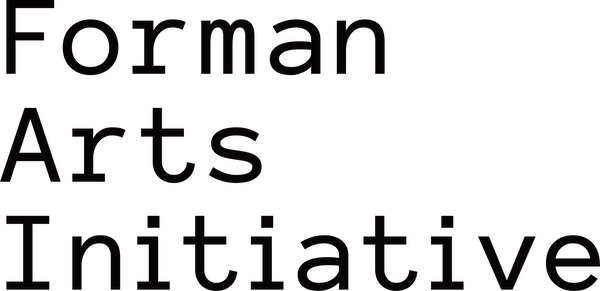 This story is part of a partnership between The Philadelphia Citizen and Forman Arts Initiative to highlight creatives in every neighborhood in Philadelphia. It will run on both The Citizen and FAI’s websites.
This story is part of a partnership between The Philadelphia Citizen and Forman Arts Initiative to highlight creatives in every neighborhood in Philadelphia. It will run on both The Citizen and FAI’s websites.
![]() MORE ART FOR CHANGE
MORE ART FOR CHANGE
Kelechi Azu signs copies of her Music Library Vol 1 for fans. Photo by Naomieh Jovin



